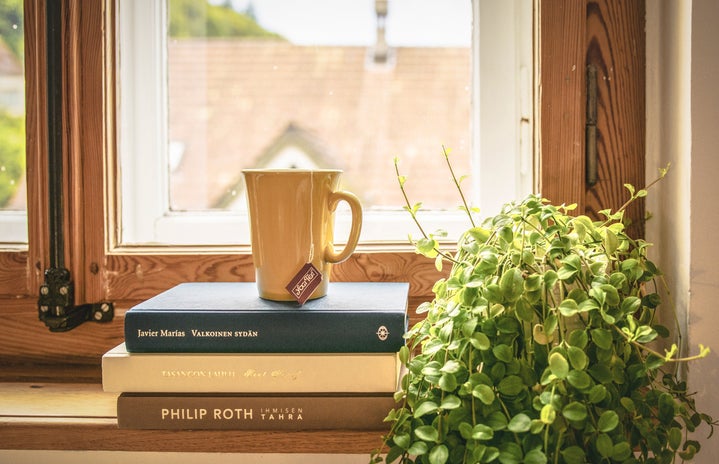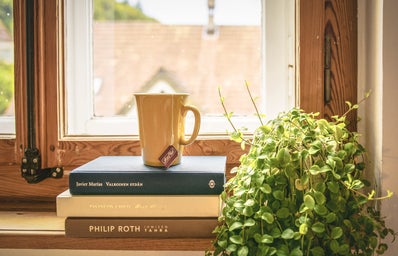I got to Central Book Exchange around 9 am on a Saturday morning. When I reached out to Pam for an interview, she suggested 9 am and I figured it’d be disrespectful to say “please, please, Pam, no.” So we met at a time I would normally be fast asleep. Please enjoy this interview or else my efforts will have been worthless. Thanks!
Central Book Exchange is my very favorite book store, and I tell people that any chance I get. To be there early in the morning, before anyone else had set foot in it, was admittedly a little magical. With the untouched shelves books, the dust filtering through morning sunlight, armed with my voice recording app on my phone and a list of questions on my notes app, I sat down across from Pam Pedersen, owner of Central Book Exchange. Pam was not the person I expected to meet, with her urban short-cut hair and stylish glasses, with the more traditionally Utahn khakis. Pam was both kind and had a presence that made you want her to be impressed with you. It is very clear that Pam is a woman who is deeply passionate about literature, as you may expect, but also deeply passionate about her community and the people in it. Here’s the interview from that bright and early morning.
How did Central Book Exchange get started?
There’s actually a debate whether it started in ‘67 or ‘68, but from everything I found it seems more like ‘68 so that’s why this year we’re celebrating as the fiftieth anniversary. Central Book Exchange has had two owners and gone through quite a bit of change. The original owner, he was kind of a visionary guy, and back in the day before the internet or anything else, he ran this as a pure book exchange. He tried to do a mail order service, which it was like he was wishing for the internet before the internet. So, moving into a store setting later where you’re working online, you know, with people really all around the world, and responding to the needs of Sugarhouse as a community, was all stuff I was able to do.
How were the early years of CBE really different from later ones?
I mean, the biggest change, really, was the use of computer technology. That’s the biggest thing noticed by you know, old customers and new customers, they’re really amazed we know where things are and exactly where they’re at. I think that’s the thing, even, with big stores, they’re like “oh, I don’t know, it should be on this shelf!” and that’s the thing I have people, over and over, tell me. People that travel a lot, go to a lot of bookstores, they say no one knows their shelves like we do.
Yeah! And that’s really impressive, in this store it feels like everything is thrown wherever—
and it’s really not
exactly! People here always know exactly where things are.
Yeah, we can look up and say “well, this number is on this shelf.” Which sounds really simple, but if you’re actually trying to make that happen it’s very complicated. It takes a lot of vision, for someone to design a computer system for a bookstore and figure out how it would work.When you walk into CBE, it feels like this timeless literary enclave. There isn’t that sense, you know, of something being built or designed in the 70s or 80s, nor does it feel like it was designed in 2018 to be super instagramable. It’s just, like—
Like we’re not trying?
Yeah! No! Wait, like in the best way!
[laugh] For sure we’re very eclectic!
In the best way! But here’s what I’m wondering, is how did CBE look a few decades ago compared to how it looked now?
Well it was very dark. Didn’t have a lot of lighting, didn’t have a lot of color on the walls. It was very dingy. I mean, I moved here in the 80’s and [gestures to front window] this side of the books, like outside of the books piled up against the windows and you could peer in through this little crack. There weren’t a lot of shelves, really dirty, really dark, but people would come in and we would win them over. It was just really bare, I guess. But we rented the building, and there’s a lot of stuff you want to do but you can’t. I have plans now for new shelving and stuff, but there’s shelves that have been here forever, since like, the 70s.
Well I love it how it is.
Me too.
Just the tight-woundedness of it feels so… literary. Here’s a big, broad question. What separates an alright bookstore from a really wonderful one, in your eyes?
I think how customers are treated is a big part of it. I’m not saying that other bookstores don’t treat their customers well, but I mean, if someone comes in to a bookstore and I’m sitting behind the counter on my phone, and I go, “oh well, I don’t know where this is, it should be over on that shelf but I don’t know.” It could come from a sincere place from the employee, but this person hears “you don’t care about me, you’re not coming out from behind the counter for me, you don’t care about me finding this.” Customers tell me that all the time. People are shocked when we’re like, “oh, I’m sure we have that, let me find that for you.” If someone needs something, and you’re able to get it for them, that matters. The people that have a little anxiety about coming in, or they’re worried, they need someone to help them. And I don’t think they always get that. I think we’re trying harder to take care of the people who wouldn’t usually come to a used bookstore.
You’re a small, local bookstore literally down the street from a Barnes and Noble, why do you think you’re still thriving?
Different audiences. There was worry about it, way back. But they send people over to us, and sometimes I’ll send people to them. I’ve said this for years: Barnes and Noble fills a great need. But they have a lot of a little. They have a whole table of To Kill a Mockingbird. We have one copy, but I also have 28,000 books they don’t have.
Can you tell us about any major, defining moments in the history of CBE?
Long before I was here, a TV show rented the store and made it a pet shop for a TV show for awhile. It forced them to pack things up and organize it, and it was quite a bit of income for the store for awhile.
This is dumb, but you know that Sugarhouse streetcar that’s been such a huge deal here for the last few years? In the 80s they tore up the streetcars that were in the streets that had been there awhile. And we almost went out of business. The whole thing was ripped apart, there were huge holes in the ground, people couldn’t get in here, they couldn’t get across the street. So they almost put me out of business ripping the old stuff out of the ground, and they want to shut the street down to put streetcars in again that people probably wouldn’t use anyway.
And also, in 2005 we brought the first computer in here. The first one. Mary, the woman who used to work here, was so freaked out. She thought “Oh no! Someone’s going to break in here and steal it!” and I had to be like “No, Mary, I promise every store on this block has a computer, we’ll be fine.”
What do you see being in store for CBE for the next ten, twenty years?
We’ll for sure have to move. I’m sniffing change in the air. We’re the last corner of Sugarhouse that hasn’t been totally demolished and rebuilt. There was a huge controversy when the Barnes and Noble moved in, and when all the small businesses were moved out. The next big question is who would want to carry this on and where we would go.
Would you stay in Sugarhouse?
No. Not for this rent. Anywhere we could go would almost triple, quadruple in rent. And, you know, the bookstore is doing fine, it’s thriving. But it’s not, you know, it’s not Chipotle.
That makes me so mad. This block is my favorite part of Sugarhouse. My mom lived in Sugarhouse before she had kids and driving around here now makes her mad.
Yeah. I mean, change happens, you know. I’m not one to fight change. But someone your age won’t know any different from how things were twenty years ago. And your grandparents wouldn’t know any different from how things were now. That’s how it goes.Why do you think that in an age of smartphones and e-books, small bookstores are still necessary?
People were really worried that people wouldn’t read books anymore. But people come in here all the time saying: why would I read on my phone? People were scared we’d all be out of business, but after a year or two, it all settled out. But in general, people who love to read love to hold, feel, smell, feel again, carry around…put a bookmark in. They just love it. And people your age don’t tend to read online, on e-readers. I think my customer age has come down on average. Because you guys read! And you read books! And you like old books! There are people who buy the brand new novels every week and then they get rid of it. Or they read on their e-reader and never read again. They’re consuming something, but they don’t enjoy it.
I can’t think of anyone under the age of thirty that I know who reads books on their phone.
No! I mean, you’re always on your phones, but not reading books. It’s a different thing, a different need.
This isn’t helpful to this interview, but I’ve been thinking a lot lately about how millennials, or gen z, or whatever, are defined by their optimism? Like we really have this belief that things will get better, you know? And I think that’s really captured by the image of us carrying around books, and having this dedication to literature and to developing the mind and being better people for it.
Totally, and it really brings the generations together and having that long-term perspective.
Why do you think, to take technology out of it, that local bookstores matter in 2018?
I mean, think of the Chipotle down the street. They provide something to the community. It’s kind of, there’s not a lot of soul or heart behind it. It’s just something to consume, like the e-reader. But someone who lives in your community, who knows your community, who has a connection between you and them. I feel that that’s so critically important in a time when people feel so isolated, like they don’t have a connection. If someone wants to find a connection, someone can come right in here and talk, and have that conversation, and share. Even if someone finds us through social media, they come in here and laugh about and talk about what they saw on social media.
You can visit Central Book Exchange in Sugarhouse at 2017 1100 E, right next to Best Friends Animal Society and Sugarhouse Coffee. You can also follow them on Facebook and check out their website. Happy book hunting!



